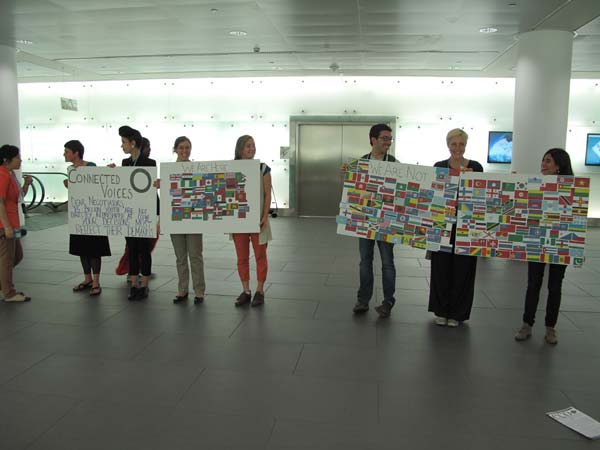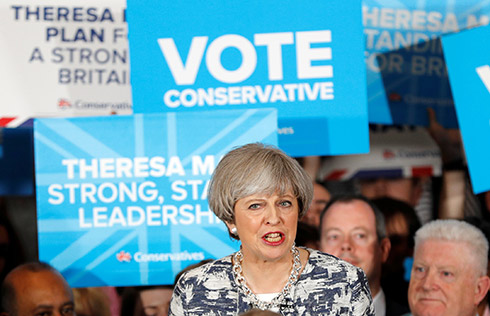

The old Chinese proverb of wanting a horse to run faster while expecting it to eat less grass may go some way in describing the complex issues facing emerging economies such as China.
The recent economic slowdown of the world's second-largest economy has raised global concerns, especially for those who enjoyed the benefits of China's robust growth, though its growth still keeps a relatively fast pace of about 7.5 percent.
 |
|
"Dear negotiators, your decisions must reflect their demands" was the message that youths conveyed to negotiators of the UN climate change conference in Doha, Qatar, from Monday to Dec 7. This year's slogan is "Count Me In". Wu Wencong / China Daily |
Unfortunately, "carbon", instead of "GDP", is the keyword at the ongoing talks in the Qatar National Convention Center, the venue for this year's round of climate change discussions.
The meeting has about 17,000 participants. You can distinguish them by the color of the badges they wear. Pink denotes delegates, orange, media, and yellow indicates non-governmental organizations.

In contrast with the major concerns of economists and business community, the focus in Qatar is how to keep the increase in global temperature less than two degrees C, in a world confronting more frequent and intense natural disasters.
Year after year, the sluggish progress made in climate change talks can disappoint the public. The talks may even take a step back, for instance, it took a few rounds of talks to set up the Kyoto Protocol and then another few rounds for some to reject it.
Setting emission targets and mobilizing funds are two major priorities here. However, a major point is largely left unsaid: Everyone wants his counterparts to commit and compromise more.
Fairness and equality are the eternal pursuit, but in reality countries are unequally blessed in some ways, such as natural resources.
The host country, Qatar, has the world's highest carbon emissions per capita, about three times as high as the United States', about eight times China's and about seven times Europe's.
It's rare to see as many gasoline-guzzling SUVs and pickups as one does in Qatar, and taps in the convention center bathrooms offer water at a temperature too hot to wash your hands.
The less than two degrees C target is like a giant half-eaten cake, but it's the only cake in the world. Those who came first have eaten some but need more for future meals, while newcomers to the party urgently need to fill their bellies.
Developing economies say developed economies need to pay the bill for their historic emissions during 200 years of industrialization, a major cause of global warming, while developed economies say that current emissions are rising fast, and developing economies need to do more.
Whether or not to respect the principle of "common but differentiated responsibilities", or to what degree the principle will be abided by, is at the root of many disputes.
However, it will never be a zero-sum game, no one absolutely wins or loses here. Though their stances and opinions differ, they have a common goal: To curb global warming and ease the adverse effects of climate change.
The talks have ups and downs, but no one will walk away from them because no one dares jeopardize future generations.
The talks are an indispensable platform for negotiators to reach political goals and secure commitments, but domestic action will be more crucial.
China is committed to reducing its carbon dioxide emissions per unit of GDP by 40 to 45 percent down from 2005 levels, by 2020.
If it can meet the upper limit of the goal, it means the country needs to cut its emissions per capita of GDP by about 4 percent a year.
It is an extraordinary challenge for China, as many developed countries failed to cut emissions by such a large scale in their development. China missed its target for slashing emissions in 2011.
But the outcome will be encouraging if such a rate can be maintained over time.
Switching to a low-carbon future is the only option for the Chinese economy, not only because of pressure from international negotiations, but also because of inner demand knocking loudly at the door. People need cleaner air, water and sustainable growth.












